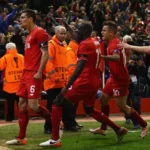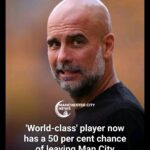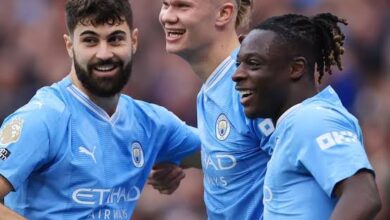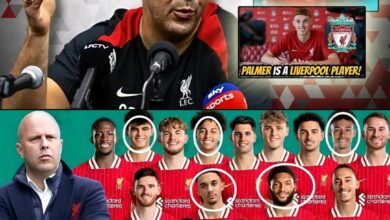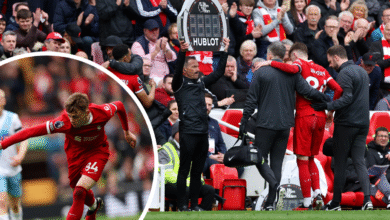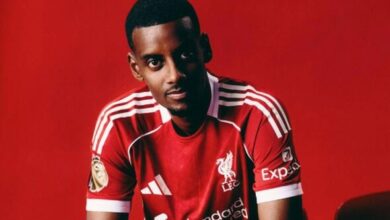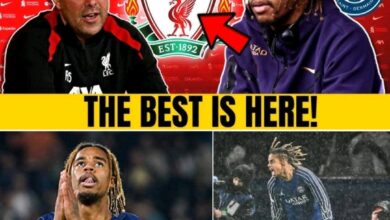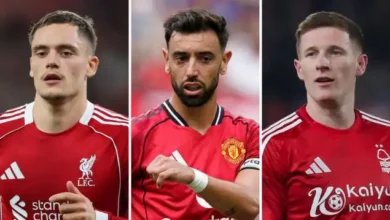Pep Guardiola’s Revolutionary Decision: Breaking His Own Rules at Manchester City
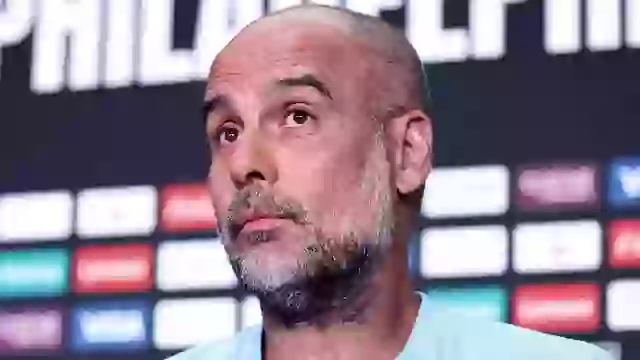
For the first time in his illustrious managerial career, Pep Guardiola has abandoned one of his most fundamental principles. The Manchester City boss, known for his democratic approach to leadership selection, has taken the unprecedented step of personally choosing his team’s captains rather than allowing the players to vote on their leadership group. This dramatic shift in philosophy comes after what Guardiola himself described as his worst season in management, marking a pivotal moment in both his career and Manchester City’s evolution.
The 2024/25 season proved to be a humbling experience for the Catalan tactician. After achieving the remarkable feat of winning four consecutive Premier League titles, City’s dominance finally came to an end. The blue side of Manchester not only failed to defend their crown but also suffered the additional disappointment of losing the FA Cup final to Crystal Palace, leaving them with a relatively modest third-place finish that, while securing Champions League qualification, represented a significant step backward for a club accustomed to collecting silverware.
The Democratic Tradition Abandoned
Throughout his managerial journey, from his early days at Barcelona through his time at Bayern Munich and into his Manchester City tenure, Guardiola has maintained an unwavering commitment to player democracy when it comes to selecting team captains. This approach has been one of his defining characteristics as a manager, reflecting his belief in empowering players and fostering a sense of collective ownership within the squad.
The system had served him well across different clubs and cultures. At Barcelona, it helped create the legendary leadership group that included Carles Puyol, Xavi Hernández, and Andrés Iniesta. At Bayern Munich, it seamlessly integrated with the club’s existing leadership culture, and at Manchester City, it had been instrumental in building the foundation for their period of unprecedented domestic success.
However, the events of the previous season forced Guardiola to reassess this fundamental aspect of his management style. “I am the manager, and for the first time in my career, I decided who will be my captains,” Guardiola revealed with characteristic directness. “I didn’t like what happened last season, and I decided this season who will represent the team.”
The Leadership Crisis
The catalyst for this dramatic change can be traced to the turbulent captaincy situation that unfolded during the 2024/25 campaign. Kyle Walker, who had been entrusted with the permanent captaincy for the previous two seasons, experienced a significant decline in form that ultimately led to his loan move to AC Milan in January. The England international’s struggles were symptomatic of broader issues within the squad, and his departure left a leadership vacuum at a critical juncture in the season.
Walker’s temporary exit paved the way for Kevin De Bruyne to inherit the armband, a natural progression given the Belgian’s status as one of the world’s premier midfielders and his long-standing commitment to the club. However, De Bruyne’s tenure as captain proved to be short-lived, as he ultimately decided to leave Manchester City on a free transfer to join Napoli, bringing an emotional end to his time at the Etihad Stadium.
The departure of two consecutive captains within a single season highlighted the instability that had crept into City’s leadership structure. For Guardiola, who places enormous emphasis on the psychological and emotional aspects of team management, this represented a fundamental breakdown in the system he had always trusted.
The New Leadership Structure
In response to these challenges, Guardiola has implemented a complete overhaul of Manchester City’s captaincy structure. The new system features a four-man leadership group, a departure from the traditional single-captain model that had previously defined the club’s hierarchy.
At the helm of this new structure stands Bernardo Silva, who has been appointed as the permanent captain for what is expected to be his final season at the club. The Portuguese midfielder’s elevation to the captaincy represents both recognition of his consistent excellence and leadership qualities, as well as a strategic move to ensure his continued commitment to the club.
Joining Silva in the leadership group are three players who represent different aspects of Manchester City’s identity and future aspirations. Rodri, the Spanish defensive midfielder who has become the engine of Guardiola’s tactical system, brings tactical intelligence and an understanding of the manager’s requirements that few players can match. His inclusion reflects the evolution of the modern captain role, where tactical awareness often supersedes traditional leadership stereotypes.
Ruben Dias, the Portuguese center-back whose arrival transformed City’s defensive solidity, represents the defensive leadership that has been crucial to the team’s success. His commanding presence and vocal nature on the pitch make him a natural leader, and his inclusion ensures that the leadership group spans all areas of the field.
Perhaps most intriguingly, Erling Haaland’s inclusion in the leadership group signals Guardiola’s long-term vision for the club. The Norwegian striker, despite his relative youth, has been identified as a future captain, reflecting both his importance to the team’s tactical setup and his potential for growth as a leader.
Guardiola’s Vision for Haaland
The decision to include Haaland in the leadership group represents one of the most fascinating aspects of Guardiola’s new approach. At just 24 years old, the Norwegian might seem an unlikely candidate for immediate leadership responsibilities, particularly in a squad containing more experienced players. However, Guardiola’s reasoning reveals his forward-thinking approach to succession planning.
“Well, first Erling Haaland is so young, but he has to start to learn what it means to be a captain, because he will be here hopefully many, many years! Sooner or later, he will take that position as first one,” Guardiola explained, outlining his long-term vision for the striker.
The manager’s confidence in Haaland’s leadership potential is based on more than just his goal-scoring prowess. Guardiola emphasized the respect that Haaland commands within the squad and his status as an “important figure” in the team’s dynamics. The striker’s record-breaking contract extension, which commits him to Manchester City until 2034, provides the stability and long-term perspective necessary for developing leadership qualities.
Guardiola’s approach to developing Haaland as a leader reflects his understanding of the modern game, where star players often become natural focal points for team leadership regardless of their traditional leadership experience. By surrounding Haaland with experienced leaders like Silva, Dias, and Rodri, Guardiola is creating an environment where the Norwegian can learn and develop these skills organically.
The Philosophy of Captaincy
Central to Guardiola’s new approach is his clearly articulated philosophy of what captaincy should represent. His definition of leadership extends far beyond the symbolic importance of wearing the armband, encompassing a comprehensive understanding of selflessness and team-first mentality.
“Captaincy, at the end, is complicated sometimes, but sometimes it’s so simple – you have to put the team, your mates, the club always in front of you… ALWAYS! All the time!” Guardiola emphasized, outlining his non-negotiable expectations for the leadership group.
This philosophy centers on a fundamental question that Guardiola believes should guide every decision made by his captains: “What is best for the team?” According to the manager, this simple principle provides an infallible guide for leadership decisions. “When you decide what is best for the team, you never make a mistake – never, ever. And this what captains have to do.”
The emphasis on collective benefit over individual interest reflects Guardiola’s broader tactical and philosophical approach to football. Just as his tactical systems require each player to understand their role within the larger framework, his leadership model demands that captains sublimate their individual desires to the collective good.
Silva’s Leadership Credentials
The appointment of Bernardo Silva as the primary captain represents a recognition of qualities that extend far beyond his technical abilities on the pitch. Guardiola’s praise for Silva reveals the multifaceted nature of modern football leadership and the specific attributes that the manager values most highly.
“Bernardo has been an incredible figure, nine years here, no injuries, always in bad moments made a step up, an example on the pitch,” Guardiola noted, highlighting Silva’s consistency and reliability as key leadership attributes. The Portuguese midfielder’s injury record is particularly significant in an era where player availability has become increasingly crucial to team success.
Silva’s ability to “step up” during difficult periods reflects another crucial aspect of leadership that Guardiola values. The modern game’s intensity and pressure require leaders who can elevate their performance when the team most needs them, and Silva’s track record in this regard has clearly impressed his manager.
Perhaps most importantly, Guardiola emphasized Silva’s willingness to communicate honestly when necessary: “when he has to say something to me as a manager, or the players, he says it because it’s the best for the club.” This highlights the two-way nature of effective leadership, where captains must be willing to challenge even the manager when they believe it serves the team’s interests.
Strategic Squad Overhaul
The leadership restructure has occurred alongside a significant overhaul of Manchester City’s playing squad, reflecting Guardiola’s determination to address the shortcomings of the previous season comprehensively. The club’s transfer activity has been characterized by both urgency and strategic planning, with investments totaling over £270 million across two transfer windows.
The January transfer window saw City invest approximately £172 million in four new recruits, demonstrating the club’s willingness to act decisively when faced with underperformance. This mid-season investment was followed by additional summer spending of just over £100 million on four more players: Rayan Ait-Nouri, Rayan Cherki, Tijjani Reijnders, and Marcus Bettinelli.
Among these acquisitions, the signing of Rayan Cherki from Lyon for a reported £34 million has generated particular excitement. The 21-year-old French attacking midfielder represents the type of young, technically gifted player that Guardiola has consistently sought to develop throughout his career. Cherki’s integration into the squad has been remarkably smooth, with early training footage suggesting an immediate connection with Guardiola’s tactical concepts.
The Cherki Factor
The arrival of Rayan Cherki has provided a glimpse into Guardiola’s continued ability to identify and develop exceptional young talent. The French midfielder’s first training session with his new teammates revealed both his technical quality and his respectful approach to joining an established group.
Cherki’s introductory speech to his new teammates demonstrated the humility and professionalism that Guardiola values: “I’m ready to play with you because you are the best players and thank you [to Guardiola],” he said, immediately acknowledging the quality of his new environment while expressing gratitude for the opportunity.
However, it was Cherki’s performance in training that truly captured attention. His display during shooting drills, particularly a strike that hit the underside of the crossbar before crossing the line, prompted an unusually enthusiastic response from Guardiola. The manager’s visible excitement and immediate embrace of the young player suggested a level of satisfaction that observers noted as exceptional, even by Guardiola’s standards.
This reaction reflects more than just appreciation for technical skill; it represents Guardiola’s recognition of a player who could fulfill a specific role within his tactical system. The manager’s history of transforming young players into world-class performers suggests that Cherki’s arrival could prove to be one of the most significant signings of the transfer window.
Looking Forward: The Club World Cup Challenge
The immediate test of Guardiola’s new leadership structure and squad composition comes with Manchester City’s participation in the Club World Cup. The tournament, which begins with a match against Moroccan side Wydad AC at Lincoln Financial Field in Philadelphia, represents both an opportunity for silverware and a proving ground for the manager’s recent changes.
The Club World Cup provides an ideal setting for implementing new systems and assessing player combinations without the immediate pressure of domestic competition. For players like Cherki, it offers the chance to make an impression in a competitive environment while adapting to Guardiola’s demanding tactical requirements.
The tournament also allows the new leadership group to establish their working relationships and demonstrate their collective ability to guide the team through challenging moments. For Haaland in particular, it represents an early opportunity to begin developing the leadership skills that Guardiola believes will eventually make him a natural captain.
The Broader Implications
Guardiola’s decision to abandon his traditional democratic approach to captain selection represents more than just a tactical adjustment; it signals a fundamental shift in his management philosophy when circumstances demand it. This flexibility and willingness to evolve, even abandoning long-held principles when necessary, demonstrates the adaptive thinking that has sustained his success across different clubs and contexts.
The move also reflects the unique pressures and expectations that come with managing at the highest level of modern football. The democratic ideals that served Guardiola well during periods of success proved insufficient when faced with the challenges of a disappointing season. His willingness to acknowledge this reality and take decisive action illustrates the pragmatic side of his management approach.
Furthermore, the emphasis on developing future leaders like Haaland demonstrates Guardiola’s understanding of the long-term sustainability required for continued success. By investing in leadership development now, he is attempting to create a foundation that will serve the club well beyond his own tenure.
Conclusion: A New Chapter
As Manchester City prepares for the new season under their restructured leadership, Guardiola’s bold decision to break with his own traditions represents both an acknowledgment of past shortcomings and a statement of future ambitions. The combination of experienced leaders like Silva and Rodri with the developing potential of Haaland creates a dynamic that could define the club’s next era of success.
The true test of this new approach will come not in the controlled environment of pre-season training or the prestige tournament of the Club World Cup, but in the crucible of domestic and European competition where Manchester City’s ambitions will be truly tested. Whether Guardiola’s unprecedented departure from his own principles proves to be a masterstroke or a temporary adjustment remains to be seen, but it undoubtedly marks a significant evolution in the career of one of football’s most influential managers.
The integration of new signings like Cherki, the development of the leadership group, and the broader squad overhaul all point toward a Manchester City determined to reclaim their position at the pinnacle of English and European football. For Guardiola, this represents perhaps his greatest challenge yet: proving that even the most successful systems can be improved when circumstances demand change.


